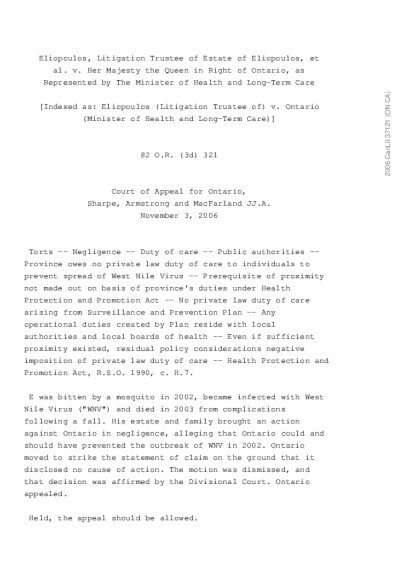
Date
Geographical Area
North America
Countries
Canada
Case Name
Eliopoulos Estate v Ontario (Minister of Health & Long-Term Care)
Case Reference
(2006), 217 O.A.C. 69 (CA)
Name of Court
Court of Appeal for Ontario
Key Facts
George Eliopoulos was bitten by a mosquito in Mississauga in 2002 and became infected with the West Nile Virus (WNV). He was admitted to the hospital and released, but died in 2003 as a result of complications from a fall. His estate and family members (the respondents) filed a negligence lawsuit against the Ontario government (Ontario), as represented by the Minister of Health and Long-Term Care (the Minister).
According to the respondents, Ontario could and should have avoided the WNV epidemic in 2002. This was one of over forty identical lawsuits filed by citizens of Ontario who contracted WNV in 2002. The province of Ontario filed a request to dismiss the respondent’s statement of claim. Since there was no cause of action disclosed, Ontario’s position was rejected by both the motions judge and the Divisional Court. The motions judge ruled that Ontario had failed to show that the estate’s inability to prevail at trial was evident. The court determined that once Ontario established and chose to implement a strategy to prevent WNV and raise awareness in the province, it owed Mr. Eliopoulos a duty of care to behave responsibly. Ontario filed an appeal with the Divisional Court, but the Divisional Court agreed with the motions judge and rejected Ontario’s appeal.
According to the respondents, Ontario could and should have avoided the WNV epidemic in 2002. This was one of over forty identical lawsuits filed by citizens of Ontario who contracted WNV in 2002. The province of Ontario filed a request to dismiss the respondent’s statement of claim. Since there was no cause of action disclosed, Ontario’s position was rejected by both the motions judge and the Divisional Court. The motions judge ruled that Ontario had failed to show that the estate’s inability to prevail at trial was evident. The court determined that once Ontario established and chose to implement a strategy to prevent WNV and raise awareness in the province, it owed Mr. Eliopoulos a duty of care to behave responsibly. Ontario filed an appeal with the Divisional Court, but the Divisional Court agreed with the motions judge and rejected Ontario’s appeal.
Decision and Reasoning
The Court of Appeal determined that imposing a duty of care on the government would impose an unjustified and unwelcome burden on the province, interfering with public-health decision-making.
Outcome
While the Ontario government had a responsibility to the general public, the Court of Appeal ruled that there was an insufficient closeness between the public authority and Mr. Eliopoulos to create a duty of care. As a result, the negligence claim was dismissed.
Disclaimer
This case law summary was developed as part of the Disaster Law Database (DISLAW) project and is not an official record of the case.
Document
Document